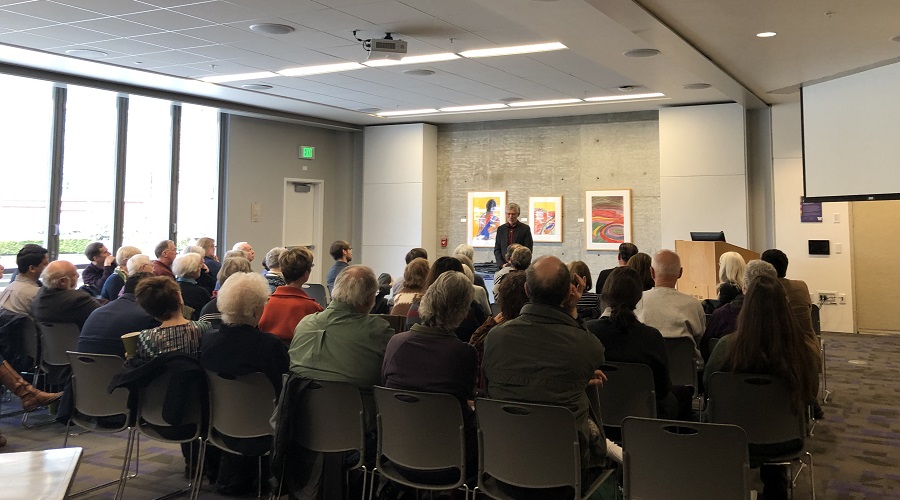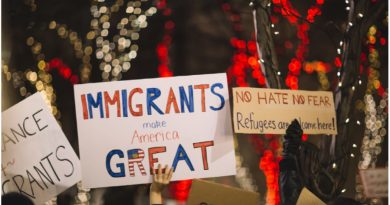Lessons for America: Refugee crisis and migration
UW retirees, alumni, faculty and students joined professor Emeritus Rob Crawford, a retired professor at the School of Interdisciplinary Arts and Sciences with a Ph.D in Political Science, for the Migration, Muslims and the Rise of the Right in Germany and Greece — Lessons for America. The event was held on Jan. 20 from 11 a.m.–12 p.m. at the William W. Philip Hall, focusing on Dr. Crawford’s past experience in Germany and Greece.
Dr. Crawford, the current founder and leader of the Washington State Religious Campaign against Torture. He also currently works in research for human rights and treatment of prisoners, as well as how to demolish torture within them. Crawford has been awarded the 2018 UW-UWRA Distinguished Retiree Excellence in Community Service Award. He has a Ph.D. in political science, and has opinion compositions currently in the works.
“Like so many other people I became more deeply involved in the politics of immigration,” said Crawford. “It quickly came into focus what I would do in Europe, which was [that] I would go and I would interview as many people as I could.”
This trip took place in the cities of Berlin, Germany and Athens, Greece. Dr. Crawford interviewed activists and academics about the political response and consequences in regards to the migration of refugees that initially became big in 2015 during a four-week period.
“I come back realizing how little I know and how much there is to learn…” explained Crawford.
According to the United Nations High Commissioner for Refugees, an estimate of 1,000,573 refugees fled to Europe by sea, primarily to Greece and Italy in 2015. The UNHCR states that half a million were Syrian refugees, who had fled the still current civil war.
“Numbers are inevitably numbing,” Dr. Crawford said. “One must at least pause for a moment and consider the UN statistics for what is described as the highest level of displacement of record.”
The numbers were indeed high, as he cited by a report from the UN, which states that there are 68.5 million people who were forcibly displaced worldwide.
A majority of the refugees who fled war torn countries, such as Syria, fled by boat — one of the most dangerous ways to travel, as the boats are filled with more people than they can carry. The Reuters organization reported that in this case, two boats were carrying a total of 23 people.
In 2015, the country of Germany decided to allow in refugees.
“Germany’s Angela Merkel did something extraordinary by announcing that Germany would step up to its moral responsibilities as a leader of a Europe committed to humanitarian principles, and in late August she announced ‘we can do this,’” Crawford said. “Germany proceeded to admit over a million migrants — a decision that included an outlay of billions of Euros to provide emergency assistance.”
Merkel’s decision had sparked outrage and many protests, such as an anti-Islam protests and a popular slogan titled “Merkel must go!” that became popular.
“ [It] changed the political landscape, not only in the right-wing strongholds of the former GDR, but across Germany,” Crawford said. “Prominent members of [Merkel’s] center right party and bavaria parties allied were taking up anti-migrant positions. Most people I talked with recognize that there are legitimate concerns about immigration that need to be addressed. Yet they also agree about the urgent necessity that convince voters that the real threat to Europe is not migration. The threat to Europe is the far right.”
According to “The Independent,” there were six European countries in 2016 that built border fences to allegedly stop the migration of refugees. These countries included Austria, Bulgaria, France, Hungary, Macedonia and Slovenia.
“‘Your papers please’ has once again become standard practice, creating an apartheid system for one of the cherished achievements of European integration for freedom of movement,” said Dr. Crawford, referring to the many border fences.
A quote by one the people Crawford interviewed emphasized the crisis and the political response to this issue.
“By donning the clothes of their enemies, they empower the people they were trying to undermine. In the process they become the beast they were fighting against.”
Referring to the title of the talk, “Lessons for America,” Dr. Crawford concluded with a final question to the audience, “What do such lessons ask of us?”





